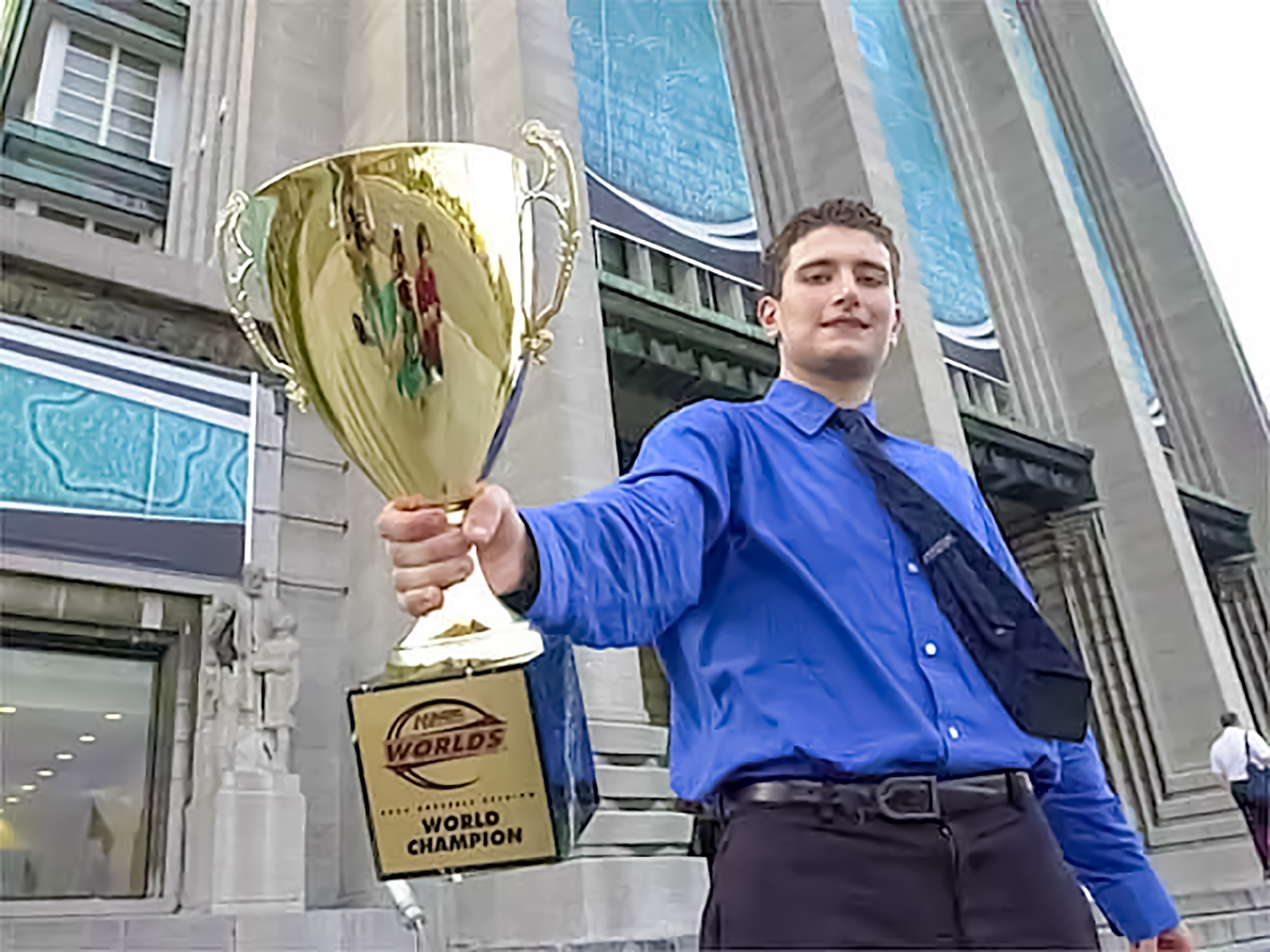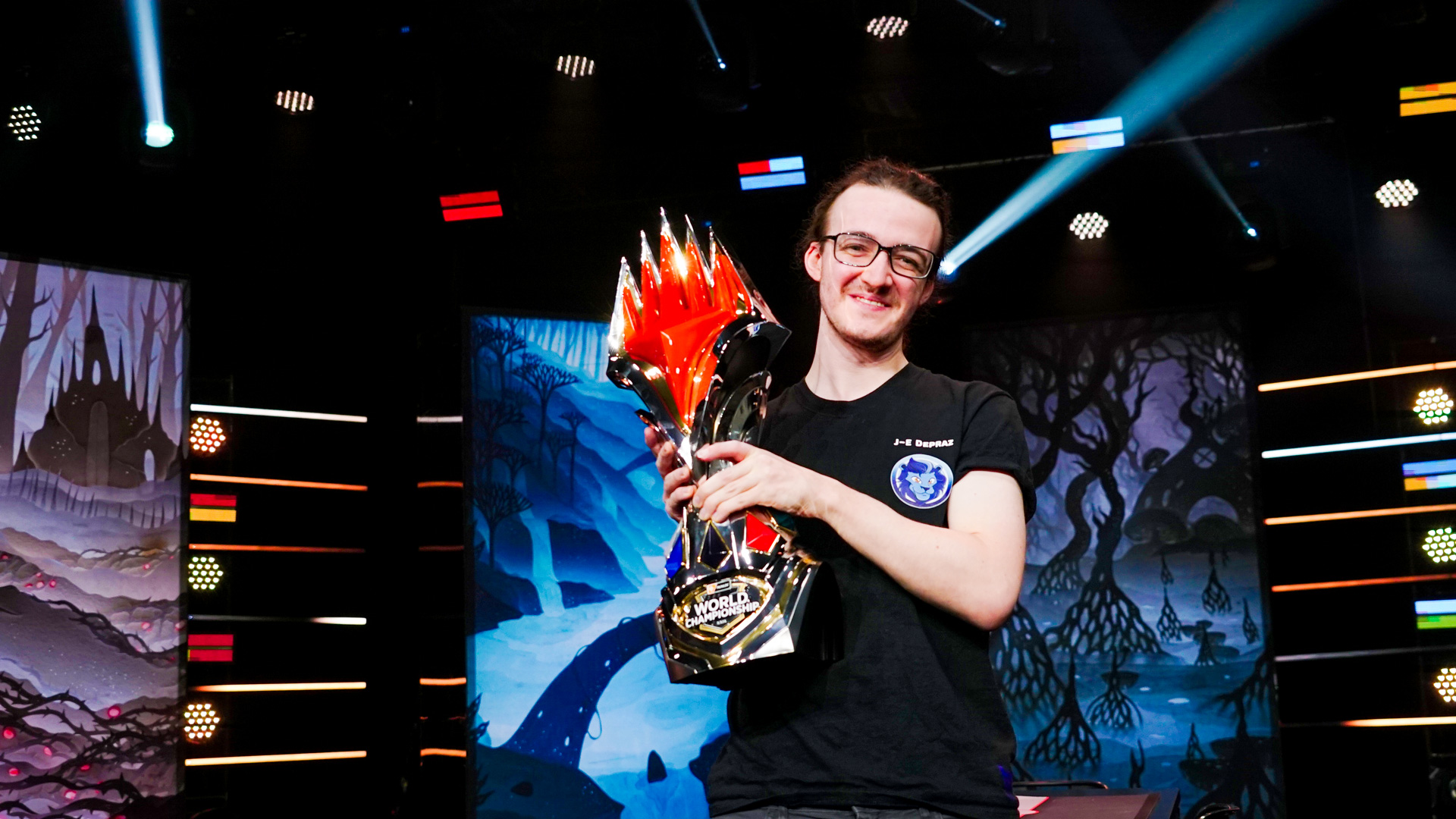It all comes down to this.
Magic World Championship 30 is upon us. In just a few days, over 100 players will travel from across the world to meet in Las Vegas, Nevada. At stake will be, well, everything. The World Championship title is unlike any other in Magic. Few have claimed it over the past decades, its weight clear to any Magic player. It's the final piece of any Hall of Fame hopeful's Magic career, and a tournament won by Kai, Jon, Paulo, and a select few others who might credibly have a claim to best of all time.
The World Championship is comprised of qualifiers from dozens of events throughout the year. All the Regional Championships, Pro Tours, Arena Championships, and Magic Online events have led to Las Vegas and Magic World Championship 30. There will be underdogs and favorites and former champs, including reigning champion Jean-Emmanuel Depraz, alongside Hall of Famers aplenty. But the devil is in the Duskmourn: House of Horror Draft details, and when the head judge calls for you to "pick up your first pack," resumes aren't relevant anymore. All that matters is how well prepared you are for the three days of competition to come.
That's what lies ahead of us: a milestone in Magic history that launches us into a new decade of celebrating Magic around the world. But what about what lies behind us? What about the 29 years of World Championships that made this moment possible?
Good news! Frank Karsten and I have been meticulously documenting each of those World Championships over the past six months here on Magic.gg. The very first World Championship in Milwaukee, the rise of Kai Budde, the ESPN days, the game's only back-to-back World Champion, the Greatest Steuer Ever Told, Depraz's dance last year—we've seen it all.
Okay, that might be a bit of homework to catch up on. Don't worry. I've compiled some of the highlights to get you up to speed before tuning into the World Championship stream on Friday, October 25, at 2 p.m. EST / 8 p.m. CEST / 3 a.m. JST.
In the Beginning
The first Magic World Championship was held at Gen Con, August 19–21, 1994. Forrest Gump had just been released, and grunge music was all the rage in Seattle, Washington, home of the fledgling Wizards of the Coast. The game was already going international just a year after its initial release. The only sets in existence for the 512 competitors who came from across the world to compete in the single-elimination World Championship were Limited Edition (Alpha), Limited Edition (Beta), Unlimited Edition, Revised Edition, Arabian Nights, Antiquities, and Legends. The rules around basic deck construction that we use today—a 60-card minimum with a 15-card sideboard and a four-of limit—had just been invented. As Frank saw in his article looking back at Zac Dolan's winning Prison decklist, it truly was a different time.
Magic history buffs know the story from there. After an auspicious start at Gen Con 1993 led to a successful World Championship there in 1994, the game exploded in popularity. The World Championship moved closer to home for the next four years, with the game's international reach on full display. Alexander Blumke, Tom Chanpheng, and Jakub Slemr brought the World Champion title to three more countries (Switzerland, Australia, and Czech Republic, respectively), with Slemr's victory famously being broadcast on ESPN as Magic started becoming mainstream for the first time.
Today, you can easily tune into Twitch or pull up a video on YouTube to find the latest deck technology or winning lists. But, in Magic's earliest years, information was scant and the earliest iterations of testing teams had just begun to form, sharing knowledge and leveling up the burgeoning Pro Tour. It was then that we saw some of Magic's most-famous decks win the World Championship.
Grim Monolith
529
6103
6150
The GOATs Arrive
By the turn of the century, Magic was hitting a groove. Buoyed by a Pro Tour, the top level of Magic was no longer marked by players putting together one-of decks the day before a big tournament but by dedicated individuals and teams who took the business of being good at Magic to a whole new level.
That set the stage for Kai Budde, the German Juggernaut, to break through at the World Championship to win Yokohama in 1999. This began the saga of the player for whom the Player of the Year trophy is now named. This also introduced us to the man whose name will forever be tied to Kai's: Jon Finkel. He won the World Championship in Brussels, one year after Budde did.
The "Jon or Kai" debate will go on forever among those of us who remember those early World Championships with a shooting pain in our backs, and it is a Magic debate that will never end, because there's no right answer. The Budde and Finkel era made it possible for Magic to be what it is today.
The best part? They're still very much a part of what Magic is today—including ahead of this very World Championship.
One of the other notes from the World Championships of the aughts is that the title went on a global tour; Finkel's title would be the last for the United States for fifteen years, when Seth Manfield won in 2015. The World Championship winners over the next five years each hailed from different countries, including the legendary Carlos Romão. The Brazilian gave his country its first title with his 2002 win in Sydney with the famous
Romão's World Championship victory helped to kickstart Magic in the region, and 20 years later, his legacy is alive and well in the steady stream of players who hail from the area.
Shahar Shenhar Repeats
Only one player has ever won more than one individual World Championship title, and that player did it one year after the other.
Shahar Shenhar was introduced to Magic as a 14-year-old in 2007, and four years later, he had made it to the Pro Tour in a stunning fashion. Shenhar won three Grand Prix events in the span of eighteen months, and then traveled to Amsterdam for the 2013 World Championship.
The tournament format changed in 2012, going from a large field of qualifiers to a much smaller, prestigious invite structure. That meant that Shenhar's qualification for the World Championship placed him among the best of the best of the best, with around half of the sixteen-player field being Hall of Famers.
It didn't matter. Like Nathan Steuer's run would a decade later, Shenhar's run through the World Championship field demonstrated the power in not knowing what you don't know, culminating in a memorable finals win with Jeskai Flash over the legendary Reid Duke. It's hard to make the Pro Tour. It's incredibly unlikely that someone will ever make the Top 8 of one or even qualify for the World Championship. Sometimes, not having been around to know how unlikely what you're trying to achieve is can be a blessing.
That said, Shenhar knew exactly how difficult winning the World Championship was when he returned to defend his title in 2014. And he embraced that challenge—and eventually, the trophy as well.
Legendary Winners
Throughout all of this, the World Championship continued to evolve. Those early experiments gave way to the familiar format we know today. We start the day with Draft, then move on to Constructed, which is also featured in the Top 8.
By the time we came to the 2015 and 2016 World Championships in Seattle, the event was truly a spectacle. So much so, in fact, that it was played on a historic theatre stage in Seattle right next to a literal Magic parade as part of PAX West, a popular gaming convention.
It was during this time that we began a run of what I consider to be legendary players. These are Pro Tour mainstays whom I was fortunate enough to get to watch as they climbed the ranks, rung by rung. The last decade of Magic champions is a list of Hall of Famers, wunderkinds, and redemption arcs made complete.
Seth Manfield and Brian Braun-Duin won those events in Seatle, as the longtime players put a crowning achievement on their long and growing resumes. Then came William Jensen in 2017, winning the World Championship in Boston, a homecoming victory for the lifelong competitor who had spent the previous two decades tearing up the East Coast Magic scene.
On the other side of that coin is Javier Dominguez, who lost to Jensen in that epic finals match.
Losses can be seen as a failure or as a stepping stone. A loss in the World Championship finals supercharges it either way. Dominguez chose to view it as validation and motivation rather than desperation.
It's safe to say it worked. He returned to the World Championship in 2018, and this time, he didn't miss.
We went to Honolulu in 2019, a Pro Tour favorite. It was another year of firsts as the tournament evolved yet again, moving to MTG Arena. But for Paulo Vitor Damo da Rosa, the platform didn't matter. The legend was in his element. And after three days of intense competition, everyone knew it.
All Magic World Champions face challenges, but no one on this list faced a challenge quite like 2020's winner, Yuta Takahashi. The tournament was played remotely with players from across the world, which meant a truly massive range of playing hours for the competitors. It was particularly tough for Takahashi, but what he lacked in sleep he made up for with his Standard Izzet Dragons deck featuring
The World Championship moved to Las Vegas following that, and we were immediately treated to Nathan Steuer's incredible, seemingly never-ending run. Last year brought us another redemption arc as Jean-Emmanuel Depraz—who lost in the 2021 finals to Takahashi—made good in his return and defeated Kazune Kosaka to win the title at Magic World Championship XXIX.
And that brings us to today. In just a few hours, the 100-plus players who hope to add their name to the annals of legendary championships will shuffle up and play. The next World Championship story is about to be told.









